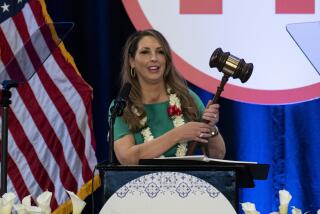Tuning Out a Bad Idea at NBC
It is one thing for management to ask someone who, say, puts wires into refrigerators to contribute to a corporate political-action committee that tries to persuade members of Congress to see things his company’s way. There is nothing very political about automatic ice machines.
Asking reporters who cover the activities of those very congressmen to make the same kinds of contributions is something else entirely. And phrasing in either case that suggests that an employee must put something into the kitty for the company lobbying effort or risk being passed over at promotion time is an odious distortion of the democratic process.
But the new president of NBC, Robert D. Wright, seemed on the very edge of making both mistakes recently. A recent transfer from General Electric Co., which now owns the network and has long maintained a political-action committee, Wright circulated a memorandum proposing an NBC committee.
That would have meant forcing NBC’s news operation to tear down the wall that must stand between journalistic independence and political prejudice--a wall that is essential for maintaining the integrity of news and analysis.
Lawrence K. Grossman, president of NBC News, promptly said nothing doing, at least in his department. Grossman did not make a federal case of it. He just said that it would violate the policy of the news department and that he and his people would not participate.
The new president backed away just as promptly. That was a wise decision, and one that Wright would do well never to reconsider.
Political-action committees are not unheard of in the publishing and broadcasting industries, but the ones that exist seem to be mostly voluntary and to stop short of taking contributions from working journalists.
That should be the end of one of the problems. But Wright probably would do well to read back over his memorandum and clear up one other point.
“Employees who elect not to participate in a giving program of this type,” it said at one point, “should question their own dedication to the company and their expectations.” That sounds as though Wright intended to keep book and to peek at the record when an employee’s “expectations” were at issue. That could well be a federal case, because the law quite clearly prohibits getting political contributions from employees under threat of job discrimination. NBC’s new president should back promptly away from that part of the memorandum, too.
More to Read
The biggest entertainment stories
Get our big stories about Hollywood, film, television, music, arts, culture and more right in your inbox as soon as they publish.
You may occasionally receive promotional content from the Los Angeles Times.










